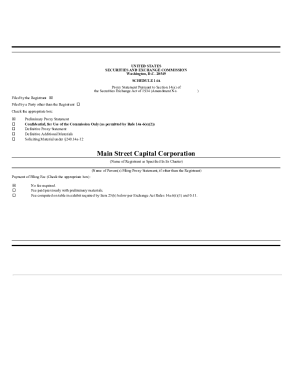The Importance Of Proxy Statements (Form DEF 14A) In Corporate Governance

Table of Contents
Understanding Proxy Statements (Form DEF 14A): A Deep Dive
What are Proxy Statements?
A proxy statement, also known as a Form DEF 14A, is a document that publicly traded companies must file with the SEC before shareholder meetings. Its primary purpose is to inform shareholders about matters to be voted on at the meeting, empowering them to make informed decisions. This legal requirement, mandated under the Securities Exchange Act of 1934, ensures transparency and promotes fair corporate practices. The SEC's role is to oversee the accuracy and completeness of these filings, ensuring compliance with regulations. Penalties for non-compliance can range from fines to legal action against the company and its executives.
Key Information Contained in Proxy Statements:
Form DEF 14A is packed with crucial information, including:
-
Executive compensation: This section details the salaries, bonuses, stock options, and other compensation received by top executives. Analyzing this data helps assess whether executive pay aligns with company performance and identifies potential conflicts of interest. Understanding executive compensation is critical for evaluating corporate governance.
-
Board of director nominations and elections: Proxy statements outline the nominations for the board of directors, providing shareholders with biographical information and the opportunity to vote for or against candidates. This allows shareholders to influence the composition of the board and ensure accountability.
-
Shareholder proposals: Shareholders can submit proposals for consideration at the annual meeting. Proxy statements will detail these proposals, allowing other shareholders to understand and vote on them. This mechanism directly enables shareholder activism and engagement in corporate decision-making.
-
Mergers and acquisitions: If a company is involved in a significant merger or acquisition, the proxy statement will provide detailed information about the transaction, its terms, and its potential impact on the company and its shareholders. Understanding these details is crucial for making informed voting decisions regarding significant corporate changes.
-
Auditor selection: The proxy statement also details the selection of the company's independent auditor, which is vital for maintaining financial transparency and ensuring the accuracy of financial reporting. This section highlights the auditor's independence and the audit process.
The Role of Proxy Statements in Shareholder Activism
Empowering Shareholder Voting:
Proxy statements are instrumental in empowering shareholder voting. By providing comprehensive information, they enable shareholders to make informed decisions on critical issues, fostering active participation in corporate governance. This informed voting can lead to significant changes within a company.
Promoting Corporate Transparency and Accountability:
The transparency demanded by proxy statements promotes better corporate governance. The detailed disclosure of executive compensation, board nominations, and other key information allows investors and the public to scrutinize a company's operations and hold management accountable for their actions. Accessing and analyzing these statements helps investors assess not only a company's financial health but also its ethical practices and commitment to ESG (Environmental, Social, and Governance) factors. For example, analysis of shareholder proposals related to climate change or diversity initiatives reveals a company's approach to these important issues.
Analyzing Proxy Statements for Informed Investment Decisions
Identifying Red Flags and Potential Risks:
Carefully reviewing proxy statements allows investors to identify potential red flags. For instance, excessive executive compensation compared to company performance or a history of shareholder proposals being rejected may signal potential risks. Analyzing shareholder proposals can give insights into the company's responses to social and environmental concerns, helping investors assess its long-term sustainability.
Resources for Accessing and Understanding Proxy Statements:
Proxy statements are readily available through the SEC's EDGAR (Electronic Data Gathering, Analysis, and Retrieval) database. Many financial news websites also provide links to proxy statements, and specialized financial data providers offer tools that help analyze and interpret the complex information contained within them.
Conclusion:
Proxy statements (Form DEF 14A) are essential tools for effective corporate governance. They provide shareholders with the information necessary to make informed decisions, promote transparency and accountability, and facilitate shareholder activism. Understanding and utilizing the information within proxy statements empowers investors to actively participate in shaping a company's direction and advocating for better corporate governance practices. Don't just passively receive your proxy statement; actively review it before voting and use your voice to drive positive change. Your informed participation using proxy statements (Form DEF 14A) can significantly impact corporate governance.

Featured Posts
-
 Fact Checking Angel Reese Quotes A Comprehensive Guide
May 17, 2025
Fact Checking Angel Reese Quotes A Comprehensive Guide
May 17, 2025 -
 Top Bitcoin And Crypto Casinos For 2025 A Comprehensive Review
May 17, 2025
Top Bitcoin And Crypto Casinos For 2025 A Comprehensive Review
May 17, 2025 -
 Koriun Inversiones Descifrando Su Fraudulento Esquema Ponzi
May 17, 2025
Koriun Inversiones Descifrando Su Fraudulento Esquema Ponzi
May 17, 2025 -
 Federal Student Loan Refinancing A Comprehensive Guide
May 17, 2025
Federal Student Loan Refinancing A Comprehensive Guide
May 17, 2025 -
 2024 Financial Report Publication Postponed A Valerio Therapeutics S A Update
May 17, 2025
2024 Financial Report Publication Postponed A Valerio Therapeutics S A Update
May 17, 2025
